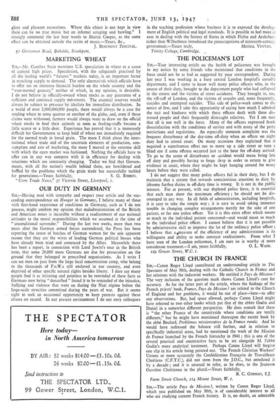THE POLICEMAN'S LOT
SIR,—Your interesting article on the health of policemen was brought to my notice by some friends who maintained that conditions in the force could not be as bad as suggested by your correspondent. During last year I was working in a busy central London hospital's casualty department, and I came to know well many police officers who, in the course of their duty, brought to the department people who had collapsed in the streets and the victims of street accidents. They brought in, too, the riff-raff of London, and the victims of assaults and, more frequently, suicides and attempted suicides. This side of police-work comes to the notice of few, and I take this opportunity of saying how much I admired the tact and kindness with which these officers dealt with these dis- tressed people and their frequently distraught relatives. Yet I am sure that all is not well in the force. Many of the officers expressed frank dissatisfaction with the conditions of service and with many of the petty restrictions and regulations. An especially common complaint was the frequent disturbance of ;the day-time off-duty when an officer on night duty had to attend court. On many occasions they explained that it required a superhuman effort not to move up a side street or turn a blind eye if some offence occurred just as the hour for off-duty arrived. To go to the scene of disturbance or accident would mean being late off duty and possibly having to forgo sleep in order to return to give evidence in court, where they might be kept hanging around for many hours before they were called.
I do not suggest that many police officers fail in their duty, but I do maintain that a system that rewards conscientious attention to duty by irksome further duties in off-duty time is wrong. It is not in the public interest. For at present, with our depleted police force, it is essential that each man show the maximum efficiency ; he should not be dis- couraged in any way. In all fields of administration, including hospitals, it is easy to take the simple way ; it is easy to avoid taking immense trouble in changing complex arrangements merely for the sake of one patient, or for one police officer. Yet it is this extra effort which means so much to the individual patient concerned—and would mean so much to the individual police officer. I cannot believe that it is not possible by administrative skill to improve the lot of the ordinary police officer ; I believe that aoneasure of the efficiency of any administration is its willingness and ability to make constant readjustment. From what I have seen of the Londcin policeman, I am sure he is worthy of more
considerate treatment.—I am, yours faithfully, 0. L. WADE. 129 Gower Street, W.C. 1.


































 Previous page
Previous page